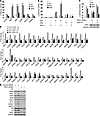Citation Information: J Clin Invest. 2012;122(8):2857-2870. https://doi.org/10.1172/JCI62676.
Abstract
The initiation of breast cancer is associated with increased expression of tumor-promoting estrogen receptor α (ERα) protein and decreased expression of tumor-suppressive ERβ protein. However, the mechanism underlying this process is unknown. Here we show that PES1 (also known as Pescadillo), an estrogen-inducible protein that is overexpressed in breast cancer, can regulate the balance between ERα and ERβ. We found that PES1 modulated many estrogen-responsive genes by enhancing the transcriptional activity of ERα while inhibiting transcriptional activity of ERβ. Consistent with this regulation of ERα and ERβ transcriptional activity, PES1 increased the stability of the ERα protein and decreased that of ERβ through the ubiquitin-proteasome pathway, mediated by the carboxyl terminus of Hsc70-interacting protein (CHIP). Moreover, PES1 transformed normal human mammary epithelial cells and was required for estrogen-induced breast tumor growth in nude mice. Further analysis of clinical samples showed that expression of PES1 correlated positively with ERα expression and negatively with ERβ expression and predicted good clinical outcome in breast cancer. Our data demonstrate that PES1 contributes to breast tumor growth through regulating the balance between ERα and ERβ and may be a better target for the development of drugs that selectively regulate ERα and ERβ activities.
Authors
Long Cheng, Jieping Li, Yongjian Han, Jing Lin, Chang Niu, Zhichao Zhou, Bin Yuan, Ke Huang, Jiezhi Li, Kai Jiang, Hao Zhang, Lihua Ding, Xiaojie Xu, Qinong Ye
This file is in Adobe Acrobat (PDF) format. If you have not installed and configured the Adobe Acrobat Reader on your system.
Having trouble reading a PDF?
PDFs are designed to be printed out and read, but if you prefer to read them online, you may find it easier if you increase the view size to 125%.
Having trouble saving a PDF?
Many versions of the free Acrobat Reader do not allow Save. You must instead save the PDF from the JCI Online page you downloaded it from. PC users: Right-click on the Download link and choose the option that says something like "Save Link As...". Mac users should hold the mouse button down on the link to get these same options.
Having trouble printing a PDF?
- Try printing one page at a time or to a newer printer.
- Try saving the file to disk before printing rather than opening it "on the fly." This requires that you configure your browser to "Save" rather than "Launch Application" for the file type "application/pdf", and can usually be done in the "Helper Applications" options.
- Make sure you are using the latest version of Adobe's Acrobat Reader.
Supplemental data - Download (1.35 MB)



Copyright © 2025 American Society for Clinical Investigation
ISSN: 0021-9738 (print), 1558-8238 (online)

